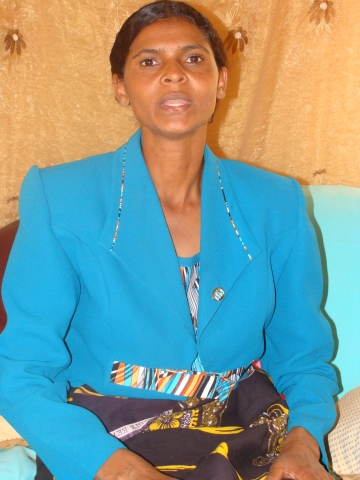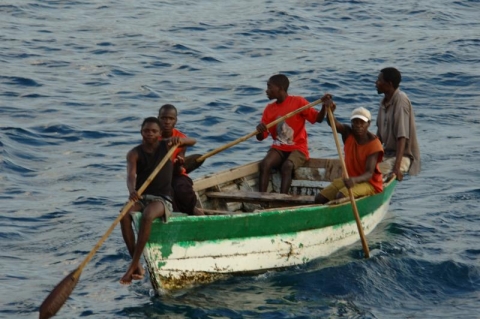Editors Note: Knight Fellow Edem Djokotoe investigates the fishing industry in Malawi
Heinrich Sitima at Wambeu Farm in Chiradzulu
The future of Malawi’s agriculture could lie in the hands of people like Heinrich Sitima, a 14-year-old school boy I met during a farm visit in Chiradzulu, a rural district some 30 minutes’ drive from Blantyre. He lives with his parents on Wambeu Farm, a 10-hectare sprawl with pigs, goats, cows, fish, bananas, cabbages, tomatoes, onions and a animal feed enterprise.
Heinrich wants to be a farmer when he grows up. He says though money from farming is a big motivator, the fact that his mother, Diana Sitima, a woman with limited education, recently went on an all-expenses-paid trip to the US to attend the 2010 African Growth and Opportunity Act (AGOA) forum convinces him about the prospects in agriculture.

Mrs. Diana Sitima: was Malawi’s flag bearer at 2010 AGOA Forum
The story of the Sitima family and their plans to expand their farming enterprise, venturing into commercial lemongrass, basil and other medicinal herbs for export was just one of a number of agricultural assignments that preoccupied me between September and October.
Our forays into the nooks and crannies of the country to get a sense of what is going on beyond the bright lights and pizza parlours of Blantyre have been particularly rewarding for me. For one thing, it is helping me take the reporters I am working with back to the basics of journalism and to an element of tradecraft that is at risk of getting lost: legwork.
Legwork took us to Mangochi via Liwonde in pursuit of a story on the fishing industry six years after government launched a five-year intervention called the Lake Malawi Antisanal Fisheries Development Project to restore the chambo population in the lake and its largest outlet, the Shire River. It got a loan of US$9.42 million and a grant of US$1.14 million from the African Development Bank in 2004 to improve fish stock as well as household income in the lakeshore districts of Mangochi, Salima, Nkhata Bay, Nkhotakota and Likoma. However, to date, the local media has not tried to find out how that money has been spent and to what end or whether the livelihoods of those the project was meant to help are benefiting. Fisheries account for four per cent of Malawi’s Gross Domestic Product (GDP).

Fishermen on the shores of Lake Malawi at Mangoch
Not only that. Lake Malawi was declared a World Heritage Site by UNESCO in 1984 on grounds that a sizeable part of the 1,000 fish species in it cannot be found anywhere else in the world. In short, there were plenty of valid reasons to justify why the fisheries story was worth pursuing.
One of the interesting things we discovered in Mangochi was that not even the chairman of the Fisheries Association of Malawi and his members, not to mention the small fishermen whom the project was meant to serve, had even heard about it.
Our investigations in the capital, Lilongwe, revealed that out of 400 fishing units meant to be distributed to fishermen around the country on a credit facility, only 20 had been given out. The units, which comprise boats, outboard motors, nets and lamps, were meant to help fishermen make it to the deeper waters of Lake Malawi where ordinary canoes cannot reach. According to the Fisheries Department, the idea was to get them away from operating from shallow waters where the fish breed to the deeper waters where they would be assured of better catch.
Meanwhile, the project comes to an end this December. We tried to get some answers from the Director of Fisheries in the Ministry of Natural Resources and Environmental Affairs, Dr. Stephen Donda, but he was impossible to get. So was his staff, including members of the team that has been coordinating the Lake Malawi Artisanal Fisheries Development Project.
Knight Fellow Edem Djokotoe and George Kasakula
For this story, which will run as a three-part series in the Weekend Nation starting 23 October, I worked closely with Philip Pemba, a reporter and his editor, George Kasakula.
But publication will not mean the end of the story. The whereabouts of the money still remains to be established. Following up this story will depend on whether the newspaper, which is already reeling from a government ban on advertising, is ready to go out on a limb—in the public interest.
Fishing contributes about four per cent to Malawi’s Gross Domestic Product, employing some 300,000 people. Sadly, fish stock in the lake and the rivers of the country has been dwindling over the years due to over-fishing.
A fishing officer in Mangochi, Andrew Saukeni said the problem of over-fishing had been worsened by the fact that fishermen do not respect fish bans or regulations which require them to return to the water any fish than is less than 15 cm long that is caught unintentionally. He added that they also insist on using fishing nets with very small meshes, contrary to national fisheries management regulations.
“The fishermen say they over-fish because they don’t have any other way of surviving and earning a living. But this argument doesn’t make sense. How do farmers who rely on rains once a year survive during the dry season?” he asked.
The stories on farming and fisheries have gone down well with the editors at the Nation, but the executive sanction for story-based approach to training and mentoring isn’t helped by the fact that staff numbers remain critically low to a point where it frustrates interventionism.
For instance, five short years ago, the Features Desk had a full-time staff complement of eight. Today, there are only two on the desk in Blantyre—one editor and sub-editor who is also expected to design and layout 16 pages a week and still find time to write features! The desk relies on insipid copy from a staffer in the northern district bureau of Mzuzu. Curiously, Nation Publications Limited does not pay correspondents who submit feature articles, though management maintains that features are “the backbone of the paper”!
This is the environment I am expected to work miracles in! Which brings me to a question I am hoping anyone reading this blog right now will help me answer. Am I Edem the Fellow or Merlin the Magician?
Just kidding. Miracles do happen. So does magic.